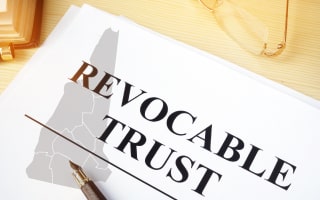How to Find Owners of Properties
in New Hampshire

In New Hampshire, property ownership is overseen and regulated by Title XLVIII of the New Hampshire Revised Statuses. Chapter 479-A focuses specifically on conveyances and mortgages of realty.
The public can access property records in New Hampshire because of the Right to Know law. In Chapter 91-A of the New Hampshire code, it's stated that the public can request copies of all records that are created, obtained, or accepted by state agencies.
New Hampshire allows real estate to be acquired and held by individuals, legal entities, and joint owners. If you want to access the ownership records of a property you're looking to buy, this information is available via many different resources. New Hampshire property ownership is often easy to detect if an individual holds a piece of real estate. However, the process is more challenging when a property is controlled by a corporation or trust.
How Do You Find Owners of a Property in New Hampshire?

If you're looking for a property owner in New Hampshire, you may need to use several methods to find the right information. Along with public records, you might be tasked with using third-party online resources. You can search the Registry of Deeds or land records databases, which are publicly available in most counties. Additionally, utilizing property records from local assessor offices or hiring a title company for a more detailed search can help you uncover ownership details. The steps you must follow are detailed below.
Registry of Deeds
Every county in New Hampshire has a registry of deeds, which is where real estate documents are stored. These documents include everything from real estate contracts to mortgages. If you want to access these documents, you can do so at your county's registry of deeds in New Hampshire. Make sure you check the hours before you visit your county's office.
When you search a registry of deeds in New Hampshire for information about a specific property, you'll need to provide the name of the owner, the parcel ID, or the address. Keep in mind that this information is also available to the public online. While some counties in New Hampshire provide the public with databases of these records, most counties use the nhdeeds.org website. The links that are listed below will take you to these databases:
- Hillsborough County
- Rockingham County
- Merrimack County
- Strafford County
- Grafton County
- Cheshire County
- Belknap County
Land Records Website
Land records in New Hampshire are created when a property is sold or transferred. If a lien or easement is added to the property, these records will be updated. Every county has a land records database, which should be available at the recorder's office. To access the land records in New Hampshire for a specific property, you must provide the same information that you need for the registry of deeds, which includes the address and the parcel number.
City or Town Assessor's Office
In New Hampshire, assessing duties are handled by a city or town assessor. Your local office will have the following records:
- Property maps
- Tax assessment records
- Ownership documents
- Property details
- Previous sales records
- Details about exemptions
To find ownership information, you can either visit your local assessor's office or obtain property records in New Hampshire online. You can reach the assessor's offices for the most populous towns and cities in New Hampshire with the following links:
Tax Records
Tax records are some of the documents that are kept in your local assessor's office. They consist of information that's included on property tax documents, which extends to assessed values, tax history, and current ownership. To obtain these documents, perform a property search on your county's online database. The records should be included with all the other property-related documents.
Title Company/Agency
During a real estate transaction, title companies can protect buyers and owners by performing title searches. If the title is free of any additional liens, encumbrances, or claims, the existing owner should be able to sell or transfer it without issue. The average cost of a title search in New Hampshire can be anywhere from $80-$200. The search will likely produce records from government archives, which means that they should provide you with a comprehensive history of the property's ownership.
If these options don't yield the necessary information, there are a few additional means of identifying a property owner. For example, you can hire a real estate agent or lawyer who might be able to gain access to this information. You could also ask the neighbors if they know who the owner is. Consider searching popular real estate websites that might contain ownership details.
![]() Online Services
Online Services
Websites such as propertychecker.com can provide you with a significant amount of property ownership information. However, the documentation you receive from a search might not be as comprehensive as the official records. With this tool, you can search New Hampshire records for information on past and current owners.
To begin your search, you must enter the parcel number or property address. After providing the right details, you should receive the following information:
- Deed records
- Property values
- Details about the property, such as the lot size
- Ownership information
- Previous sales
- Foreclosure details
- Lien records
- Information about past building permits
- Neighborhood data
- Loan records
- Property tax records
What Are the Different Types of Property Ownership in New Hampshire?

Property ownership isn't as simple as buying a piece of real estate and putting it under your name. Real estate can also be purchased alongside your spouse or with other unrelated parties. By gaining a better understanding of the types of New Hampshire property ownership, you can determine which title is right for you. Your choice dictates everything from the level of risk you take on to the financing solutions you have access to.
There are numerous ownership types in New Hampshire, each of which has its own legal and financial implications. The most common forms of ownership in New Hampshire are sole ownership, tenants in common, and joint tenancy. The following highlights every ownership title as well as its benefits and implications:
-
Sole Ownership: One person has the entire rights to a property. Total control over property decisions. Personal liability for property taxes and debts.
-
Joint Tenancy: Multiple people have equal shares in a property, which comes with the right of survivorship. Property can be transferred after death without going through probate. After an owner sells, the joint tenancy ends.
-
Tenants by Entirety: Married couples can create this type of joint tenancy. Provides survivorship rights and protection from creditors. Spouses need to agree to all property decisions.
-
Community Property: Spouses acquire a property during their marriage. Maintain equal rights to sell, use, and manage the property. The real estate must be equally divided after a divorce.
-
Tenancy in Common: At least two owners have unequal or equal shares without traditional survivorship rights. An owner can place their shares in an inheritance or sell them independently. Disputes and disagreements might arise over how the property should be sold or managed.
-
Condominium Ownership: Many individuals have units in a complex. Individual owners have a personal living space and access to community amenities. HOA fees and rules might apply.
-
Cooperative Ownership: Residents collectively hold a property. This legal structure allows for lower purchase costs and greater community control. Selling shares can only occur after other members approve.
-
Trust Ownership: Real estate is placed in a trust account for beneficiaries. Protects assets from future creditor claims. Managing or transferring the property might be complicated because of the trust structure.
-
Life Estate: Ownership lasts until the person dies. Can use and benefit from the property while alive. The remainderman needs to consent before transferring or selling property interests.
Finding the Owner of a Trust or Corporation that Owns Properties in New Hampshire

Many parties can own real estate in New Hampshire, which include the following:
- C or S corporation
- Individual
- Trust
- Limited liability company
- Partnership
You can gain assistance from a real estate lawyer or title company if you need help finding the owner of a corporation or trust in New Hampshire. To search for this information yourself, there are several steps you may need to take. These may include searching business databases, cross-referencing property records, and checking with local chambers of commerce for additional information.
For example, you might be tasked with searching Westlaw, LexisNexis, or other business databases for this information. You can also cross-reference mortgages, tax documents, and deeds to find the name of the owner. Consider visiting your local chamber of commerce as well.
Finding the Owner of a Trust in New Hampshire
To identify the owner of a trust in this state, you may need to perform a property search through your county's online database. This information typically isn't recorded. However, real estate attorneys have experience finding third-party individuals who hold trust accounts.
Finding the Owner of an LLC in New Hampshire
You can easily find the owner of an LLC in New Hampshire by accessing the Department of State's website. On this site, you'll discover a business search tool that allows you to look for an LLC. Once you enter the name of the limited liability corporation, you should receive the ownership documents for any property it holds.
Finding the Owner of a Corporation in New Hampshire
To find the owner of a New Hampshire corporation, use the same business search tool that can help you identify LLC owners. Four search parameters can narrow your search, which include the business name, ID number, filing number, and registered agent name.
Common Methods of Property Transfer in New Hampshire

When a property owner wishes to legally transfer their property, a deed must be created. This document includes everything from the details of the transaction to the names of the seller and buyer. It will also outline any claims or rights associated with the property. There are many types of deeds available in New Hampshire, including grant deeds and mortgage deeds. The most common deed types are general warranty, quitclaim, and fiduciary.
-
General Warranty Deed: This type of deed includes warranty covenants that offer a high level of protection against future title claims. It guarantees that there are no encumbrances or liens on the title. This document also informs the buyer that the seller has the right to convey the property. The seller will defend against any lawful claims to the property as well.
-
Quitclaim Deed: A quitclaim deed provides zero buyer protection. It doesn't even guarantee that the title is free of claims and encumbrances. Because of the lack of protection, this type of deed is mainly used when transferring property between family members or into a living trust.
-
Fiduciary Deed: This deed doesn't include any covenants or warranties. If the signatory is serving as a guardian or an executor of an estate, a fiduciary deed will be drafted when transferring ownership.
Step-by-Step Guide to Property Transfer in New Hampshire

Before you transfer or sell a property, you need to understand the many legal and administrative steps that take place throughout this process. You must first identify the type of property transfer you're using, which can be a sale, gift, or business transfer. The next step involves requesting a title search. The lender may also require you to purchase title insurance to protect against potential claims.
The deed will now be prepared with all the necessary details about the transaction. Keep in mind that this document must be signed by both parties in front of a licensed notary public. Before you're able to record the deed, you must pay the transfer taxes. In New Hampshire, the transfer tax is $0.75 for every $100 in sale price.
Once the deed is officially recorded, you'll obtain a receipt. Make sure you update the records about this transaction. For example, your local assessor should be informed to ensure the new owner receives their tax bills.
Property Ownership Guide
- How to Find Owners of Properties in New Hampshire
- How Do You Find Owners of a Property in New Hampshire?
- What Are the Different Types of Property Ownership in New Hampshire?
- Finding the Owner of a Trust or Corporation that Owns Properties in New Hampshire
- Common Methods of Property Transfer in New Hampshire
- Step-by-Step Guide to Property Transfer in New Hampshire
New Hampshire Homeowner Lookup
- Owner(s)
- Deed Records
- Loans & Liens
- Values
- Taxes
- Building Permits
- Purchase History
- Property Details
- And More!
Property Ownership Guide
- How to Find Owners of Properties in New Hampshire
- How Do You Find Owners of a Property in New Hampshire?
- What Are the Different Types of Property Ownership in New Hampshire?
- Finding the Owner of a Trust or Corporation that Owns Properties in New Hampshire
- Common Methods of Property Transfer in New Hampshire
- Step-by-Step Guide to Property Transfer in New Hampshire